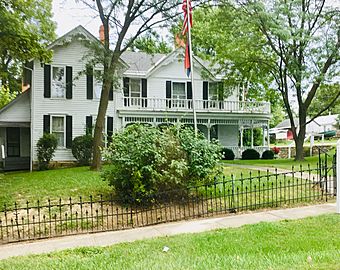James Beauchamp Clark House facts for kids
|
James Beauchamp Clark House
|
|
 |
|
| Location | 204 E. Champ Clark Dr. Bowling Green, Missouri |
|---|---|
| Area | less than one acre |
| Built | 1888 |
| Architect | Ezra Kirkland |
| NRHP reference No. | 76001114 |
Quick facts for kids Significant dates |
|
| Added to NRHP | December 8, 1976 |
| Designated NHL | December 8, 1976 |
The James Beauchamp Clark House, also known as "Champ" Clark House or Honey Shuck, is a special old house in Bowling Green, Missouri. It's called a historic house museum, which means it's a house kept like it was in the past so people can visit and learn.
This house is very important because it was the home of James Beauchamp Clark (1851–1921). He was a very important US Congressman in the early 1900s. Because of its history, the house is a National Historic Landmark. Today, you can visit it for tours, especially in the summer.
Contents
About the Clark House
The Clark House is located in a quiet neighborhood in Bowling Green. It's a two-story house made of wood, built in 1888 by a person named Ezra Kirkland.
What Does It Look Like?
The house has a porch that wraps around the front and sides. This porch has a flat roof supported by decorative columns and fancy wooden brackets. The inside of the house has been carefully restored. It looks just like it did when James Beauchamp Clark lived there.
Who Was "Champ" Clark?
James Beauchamp Clark bought this house in 1898. This was a few years after he was first elected to the United States Congress. In Congress, he was a member of the Democratic Party.
Clark became a very important leader. In 1908, he became the leader of the minority party in the House of Representatives. Then, in 1911, when his party gained control, he became the Speaker of the House. The Speaker is the leader of the House of Representatives, a very powerful position.
He was even considered to be a candidate for president in 1912, but he didn't get the nomination. Clark continued to serve as Speaker of the House until 1919. He lost his re-election in 1920.
The House as a Museum
After Clark owned it, the house was changed into several smaller homes. Later, a local non-profit group bought the house. They worked hard to restore it and turn it into the museum you can visit today.
More Places to Explore
 | Leon Lynch |
 | Milton P. Webster |
 | Ferdinand Smith |



